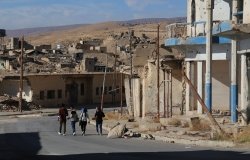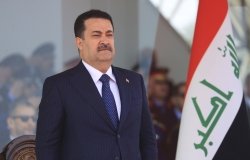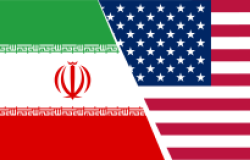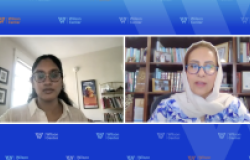Egypt in Crisis
The Muslim Brotherhood has been overthrown, its leaders jailed or on the run, and the Egyptian military is again ruling the country. In a new FRONTLINE documentary, a follow up to the 2011 Emmy Award winning film, "A Revolution in Cairo," GlobalPost's Charlie Sennott explores the current moment of upheaval and chaos. He will discuss his most recent analysis of the origins of the crisis in Egypt and what happens next.
Overview
Charlie Sennott, Vice President, Editor at Large, and co-founder of GlobalPost, discussed the current challenges facing Egypt following the overthrow of former Egyptian President Mohamed Morsi.
On November 15, 2013, the Middle East Program at the Woodrow Wilson Center held a meeting “Egypt in Crisis” with Sennott. Robert Litwak, Vice President of Scholars and Director of International Security Studies at the Wilson Center, moderated the event. Litwak provided opening remarks highlighting Sennott’s experience in journalism.
Sennott began his presentation by discussing how the upheaval in Egypt was a once in a century event. He noted the last time that there had been a similar political and cultural collapse of the region transpired with the fall of the Ottoman Empire following World War I. He expressed his affinity for Egypt, noting that GlobalPost had maintained an office in Cairo for about five years prior to the Egyptian Revolution that began in January 2011. He described arriving at Tahrir Square to help cover the event for the news program Frontline on PBS, noting that his favorite sight in Tahrir Square was the “Green Tent,” where the Revolutionary Youth Council convened. Sennott described the Revolutionary Youth Council as an eclectic mix of individuals from a variety of backgrounds, including those who were secular as well as younger members of the Muslim Brotherhood. He stated that under Hosni Mubarak’s regime, individuals from such diverse backgrounds would never have gathered in the same place.
Because of this mobilization across ideological lines, Sennott described the initial atmosphere in Tahrir Square as optimistic and hopeful—this was a sharp contrast to the events of this past summer in Egypt. Discussing the removal of President Mohamed Morsi, Sennott said there is no manner to address it except as a military coup. He noted that the optimism of the initial revolution had been replaced with a sad stage of violence distinct even from previous eras of military violence. In this current crisis, Sennott stated that the military has shown a willingness to open fire on protesters and arrest members of the Muslim Brotherhood. Discussing the Revolutionary Youth Council that met at the Green Tent during the 2011 demonstrations, Sennott said that the leaders have been unable to gather into a single room because each side accuses the others of betraying the core of the revolution. Despite this difficulty, Sennott expressed his hope for the future of Egypt and indicated that he remains optimistic.
Sennott presented three video clips from the Frontline documentary on Egypt, which showed how President Morsi sought to appease the military only to be overthrown. Sennott noted that while the brief video clips did not show the full extent of the crisis, such as the failures of President Morsi to effectively govern, the full documentary provides greater context and balance. Sennott concluded his initial discussion by questioning the role of the United States in the Arab Spring. He framed it as a question of democracy versus stability, asking which value the United States prioritized the most in this situation.
By William Drumheller, Middle East Program
Speaker
Hosted By

Middle East Program
The Wilson Center’s Middle East Program serves as a crucial resource for the policymaking community and beyond, providing analyses and research that helps inform US foreign policymaking, stimulates public debate, and expands knowledge about issues in the wider Middle East and North Africa (MENA) region. Read more
Thank you for your interest in this event. Please send any feedback or questions to our Events staff.










